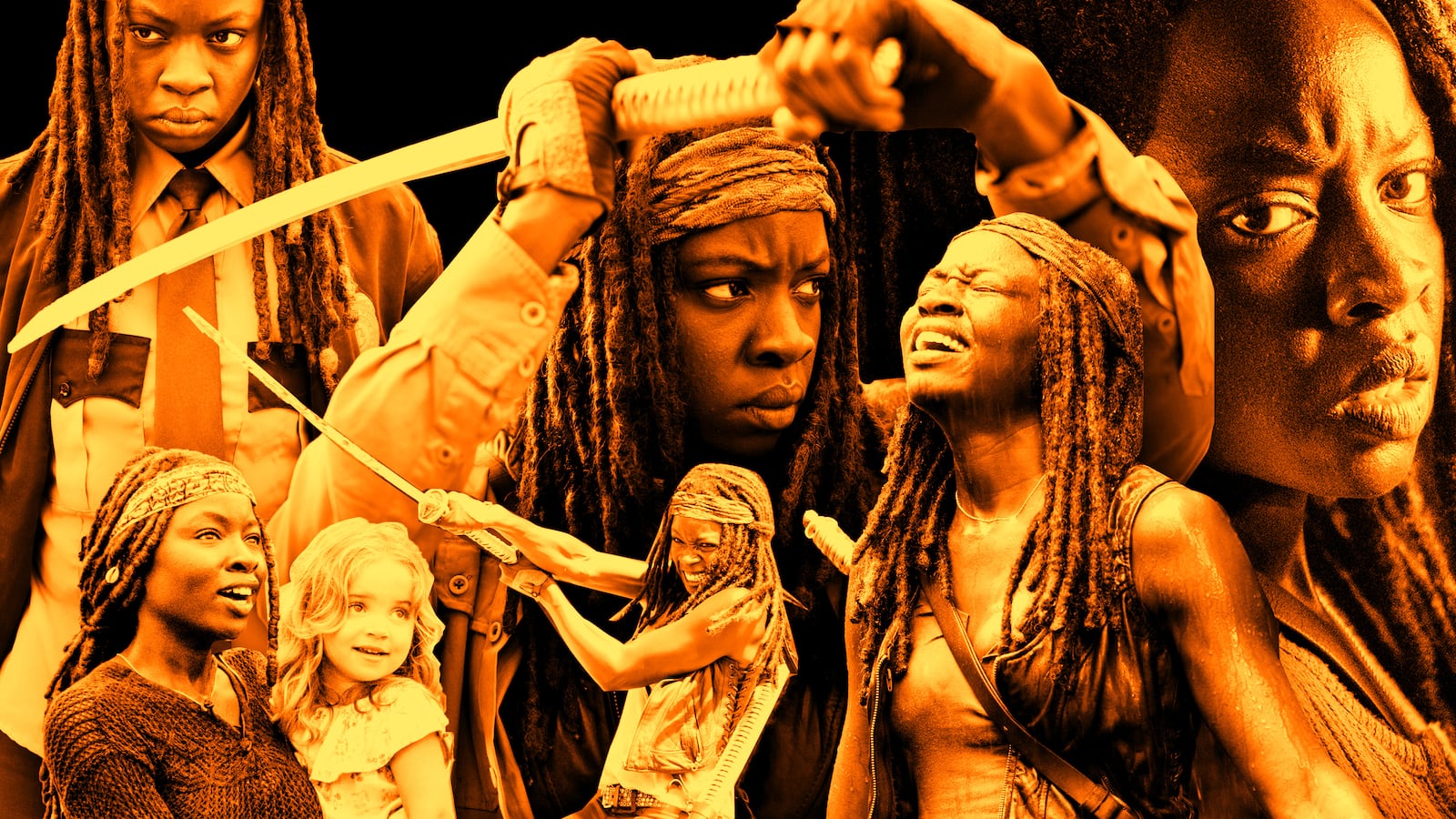What would The Walking Dead be without Danai Gurira?
Michonne seized viewers’ attention from the moment she first appeared onscreen at the end of the AMC drama’s second season—her face obscured under a large hood, with two mouthless, armless zombies chained behind her. For a while, Michonne was a one-note “badass” character who didn’t do a whole lot of talking. But over the years, she blossomed into something much more interesting as Gurira sank her teeth into more substantial material—imbuing it with rawness, wit, and vulnerability. In a show about the undead, inspired by a genre that loves larger-than-life spectacle, Gurira has brought a much-needed ingredient: humanity. As the character appears set to make her exit from the show this week, it’s worth remembering where The Walking Dead was as a franchise when Michonne made her debut—and how Gurira’s very presence has transformed it.
By the time Michonne showed up at the end of the show’s second season, its plot had come to a grinding halt. Rick Grimes and his group had gotten stranded on a farm—transforming what had started out as a captivating, if uneven, zombie drama into a second-rate soap opera. (At one point I will never forget, two characters argued on screen about whose turn it was to do laundry; it was rough.) When the farm burned down at the end of the season, a chorus of Walking Dead fans could be heard in the distance belting out the “Hallelujah” chorus.
And then, out of nowhere, there was Michonne—who emerged in the forest just in time to rescue an imperiled member of the group. Fans didn’t see Michonne’s face in the Season 2 finale, but they saw the katana and the zombies behind her—a shot that was visually tantalizing enough to intrigue even those who didn’t recognize the character from the comics. It was a killer hook.
For more than a season, Michonne spoke little and lopped off a lot of heads. And while no one would dispute that watching her decapitate zombies with that katana was entertaining, she was underwritten. On a show that had already been criticized for casting what was supposed to be Atlanta with only two or three black people at a time, Michonne’s shallowness stuck out even more. (It also didn’t help that in its first few seasons, The Walking Dead developed a habit of introducing black characters one at a time only to kill them off.) In Season 3, Gurira and The Wire alum Chad Coleman began to change that as characters who, rather than feeling like token accessories to the plot, helped drive home the show’s key thematic messages. But it took time.
Most actors could not pull off what Gurira did with Michonne’s material. Silent intelligence can be hard to telegraph, and one of Gurira’s strengths as a performer is her expressiveness. Her eyes alone can convey a million emotions at once—a quality that allowed her to give Michonne enough nuance and charisma to keep viewers invested in her emotionally.
And then came Season 4. Halfway through the season, The Walking Dead finally revealed Michonne’s backstory. She’d once had a son, Andre—a toddler. She and her boyfriend had lived together, but one day walkers attacked their home while she was away—and her boyfriend and his friend were too high to defend themselves or her child. Because of this, she wandered the post-apocalyptic world alone—trusting no one, using her zombified ex and his friend as pack mules.
Michonne’s bond with Andrea was crucial to opening the character up, but the most important bond she formed in the series was with the person to whom she first told that story: Rick’s son Carl. That bond, it turned out, would become crucial to the series moving forward. In episodes like Season 4’s “Claimed,” which finds Michonne trying to cheer up a morose Carl by filling her mouth with Cheez Wiz and stealing a cat statue, Gurira finally got to show off her comedic chops—and prove that, yes, even Michonne has a sense of humor. And although it had been clear before that Michonne had suffered a traumatic loss—in this show’s world, who hasn’t—her tearful account of the incident gave that loss shape and meaning. In both Carl and his younger sister, Judith, Michonne found ties that helped ease the burden of what she’d lost.
And then there was her romantic relationship with Rick Grimes himself—a complete left-turn from the comics, which paired Rick with Andrea (long dead on the show). Some fans whined that love would dilute Michonne’s “badass” image—not to mention Rick’s. But that was always a misguided fear; instead, as with all of her other significant relationships, it allowed even more facets of the once-standoffish character to emerge. The intimacy she shared with Rick—especially their mumbled bedroom conversations about their days—were amusingly casual, and grounded a series that often deals in grandiose stakes.
It’s unclear how Danai Gurira’s seven-year run on The Walking Dead will end, but regardless, her loss will be palpable. With Lauren Cohan headed back to the series sometime this season, there will at least be another long-serving cast member on hand to ease the pain. Even so, those are some huge combat boots to fill.

